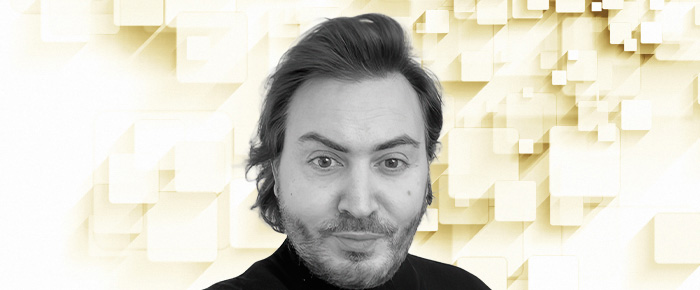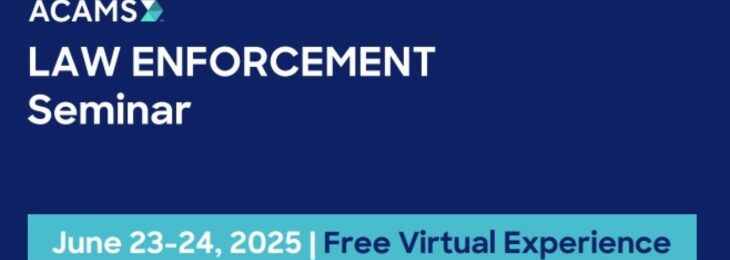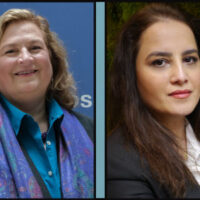
Dan Benisty is the director of compliance for the anti-money laundering and counter-terrorist financing (AML/CTF) program for the Northern European region at Western Union. Benisty is a co-founder and president of the ACAMS France Chapter, which he has chaired since its establishment in 2013. In addition, he is joint director of the AML/CTF compliance degree program at Université Paris-Saclay.1 Having been interviewed by several national newspapers in France, he talked to ACAMS Today Europe about his perception of compliance.
ACAMS Today Europe: You have a master’s degree in international finance, what led you to pursue a career in compliance rather than finance?
Dan Benisty: Through my studies in business school, my focus was more on financial mathematics. My curriculum did not have any class dedicated to compliance, simply because back then these classes did not exist in the way they do today. So, I naturally opted for the trading floor of a French bank in my last year of university. I spent my early days mapping risks, i.e. listing the trades, information systems, evaluating their risk, estimating losses and putting together a business continuity plan. This auditing work is a prerequisite for any self-respecting compliance activity. Looking back at it now, when compliance did finally appear, I found a way of combining my inherent values with my professional activities. In this case, I think compliance came to me by appealing to my personal values.
AT Europe: As director of compliance at Western Union, what improvements have you seen following the implementation of an AML/CTF compliance program?
DB: Western Union was ahead of the curve in that it created a ‘risk’ department dedicated to AML/CTF. Generally, within financial institutions, risk departments cover all risks. This dedicated risk department is tasked with assessing intrinsic threats from external and internal sources at a global, regional, national and inter-country level (which involves analysing the potential links between several countries). This meticulous work allowed us to gain a much more refined grasp of the risks, AML/CTF mechanisms and frauds, as well as a clear picture of the client profile and its potential inherent risk. This risk analysis led to the creation of a document that lists the measures to be implemented in order to minimise the risks once detected. The rules, indicators and by extension the computerised screening processes, have been finely tuned. It is also possible to identify if a risk or threat has appeared, if it has increased and whether an existing screening rule needs to be adjusted as a result. If an information source, either public or private, notifies us of a new situation or risk, we can then translate that threat using a screening rule, which allows us to reduce the risk rapidly.
AT Europe: In your opinion, what would the ideal compliance team look like?
DB: I cover this question in the class I teach for the degree program. As a matter of fact, there is no such thing as the ideal candidate! Personally, I put a team together with profiles that complement each other. Compliance is, by nature, at the intersection of fields as disparate as law, business, investigations and communications. A comprehensive knowledge of law and notably a certain talent for finding, reading or interpreting a text is certainly an asset. A good knowledge of the business world is also valuable. For instance, I think of colleagues who are well-versed in the product as well as the mechanics of the information systems or supply chains. Then there are a few qualities that are more than welcome. The ability to communicate with many different parties at all levels is one of them. Being able to speak effectively to both management and agents, who may not have the same level of fluency, is a must. This is what I call a ‘wide communicational range.’ You need to be able to simplify a subject that may be quite complex, whilst keeping sight of the bigger picture. Over time, there will be presentations to committees as well as internal and external trainings. One must persuade, assess the risks of a business strategy and sometimes influence that strategy. It is important to be able to defend your arguments and show that they are well-founded, a bit like a lawyer would do. The field of compliance is avid of charisma, even more so today, when it is at the heart of a company and its strategy.
AT Europe: How does a robust compliance program benefit financial institutions?
DB: Compliance can be a huge asset in standing out from the competition. Today, the image and reputation of an excellent AML/CTF program allows companies to score bonus points when it comes to landing contracts or partnerships. In the future, any partner wanting to work with Western Union, for example, will check its reputation. This potential partner will go over our compliance program in fine detail. The more robust our program is, the more it will support our strategic goals, and in turn, the more we will be able to take advantage of its benefits and earn more points over the competition.
Reducing compliance to a minimum is counterproductive. I think you need to be able to find the right balance and invest wisely. Nowadays, we have automated monitoring systems. Until recently, some of these screening operations were done manually and that is without mentioning the arrival of artificial intelligence (AI) in the field of compliance. You need intelligent systems that can process billions of data points. When properly implemented, AI allows you to refine monitoring scenarios and reduce the costs of compliance.
AT Europe: What strategies have you adopted to detect and prevent criminal activities such as human trafficking and wildlife trafficking?
DB: Western Union is at the forefront in the global fight against human trafficking. Employees and agents are trained to detect and report any suspicious activity where this is concerned. This training is even more in-depth for agents operating in areas identified as higher risk. Western Union has also participated in and organised conferences around the world to share information with the authorities and various non-governmental organisations (NGOs) concerned by the scourge of human and wildlife trafficking. Among the company’s initiatives, one worth highlighting is the implementation of an international platform, accessible to NGOs, authorities and financial institutions in addition to its collaboration with the working group on human trafficking led by the Joint Money Laundering Intelligence Taskforce. This working group brings together financial institutions, government agencies, as well as the secretary of state for the UK Home Office, in order to promote the exchange of information, not to forget our partnerships with the US Department of Homeland Security, Interpol and Thomson Reuters.
AT Europe: What challenges lie ahead for the financial services sector in Europe?
DB: Some new players have very low overheads and production costs, as they operate entirely online. We are also seeing the emergence of new digital players whose core activities are not in the transfer of money or digital currency, but who are still looking to move into the sector—I am thinking of Google, Apple, Facebook and Amazon in particular. These new players embody the challenges that lie ahead, notably for Western Union, which has higher overheads due to its network of agents. I should also mention the appearance of new methods of fundraising such as crowdfunding, which is revolutionary and has introduced new typologies in terms of AML/CTF. These new players have led us to puzzle over new and potentially suspicious patterns, which can also intersect. We are familiar with the old typologies, but these new risks intersect with multiple activities and can involve the transfer of money to electronic currency via cryptocurrencies, posing a real challenge.
I think that the preventive measures in place, within the framework of AML/CTF, have considerably reduced underground financing. Some still get around the system, but less than before. Thirty to 40 years ago, finance was still relatively focused on a single product and it was highly localised. Nowadays, we are dealing with a truly multifaceted system. If it was still relatively easy in the past for a state to identify offences, it is now an altogether more difficult task. Therefore, it is not surprising for states to have considered delegating part of this surveillance. All the business lines linked to AML/CTF, the so-called ‘subject entities’, have now become armed wings of the state. It is worth mentioning that these subjects are not exclusively from the world of finance; they are also notaries, lawyers, auctioneers, estate agents and many others. To paraphrase Joseph Stiglitz, some companies have become more powerful than some states. That explains why the state would delegate power and monitoring duties to them.
AT Europe: How has your department adapted to the pandemic?
DB: As with all companies around the world, all the necessary measures were taken to protect employees during the pandemic and as a result; we adjusted to the environment and massively adopted telecommuting. This new norm was just a formality, as there was a high-level of flexibility at Western Union and remote work was already engrained in the company’s culture. However, the pandemic impacted several compliance procedures. For instance, the inspection tasks carried out by agents in the ‘agent oversight program’, most of which were carried out on site, will now be conducted remotely until further notice due to COVID-19. As a result, the risk assessment matrix will have to be reviewed. Finally, as stated by the Financial Action Task Force (FATF), as well as several regulators in Europe, regular analyses are carried out to detect potential new patterns of money laundering and fraud in particular, which could be linked to this global pandemic.
AT Europe: What is the secret to your success in the financial crime prevention sector?
DB: Being in the right place at the right time! I sensed quite early on that compliance was going to continue to evolve and become a profession of its own. Fortunately for me, it soon went beyond the simple gathering of regulatory bank assessments. In summary, my deeply held personal values are reflected in the ethical and professional values that are conveyed by compliance. So, in that sense, compliance is also a passion. Being able to share this passion and the experience I have gained, and continue to gain, with future generations means a lot to me. Without wanting to sound too idealistic, hidden behind that urge is a desire to see a better world. I have come to the realisation that through our work, we can be part of something greater than ourselves. Working in compliance is trying to introduce or reintroduce ethics in a society that sometimes may be lacking. Compliance carries a political aspect to it, a concept of the collective, that aims to improve the world for everyone without being attached to any political party. I like the image of the weighing scale as a symbol of justice. I am constantly looking to find a balance as there is no getting around the concept of creating value. Finance is essential. As a result, I am always on the lookout for ethics and for ways to reconcile them with the world in which we operate. As a job, compliance allows me to bring those two worlds in line.
Interviewed by: Nathalie Bosse, CAMS, T & Co, founder, France, nathalie.bosse@protonmail.com
- “DU Compliance Officer, spécialité lutte-anti-blanchiment,” Université Paris-Saclay, https://www.uvsq.fr/du-compliance-officer-specialite-lutte-anti-blanchiment










